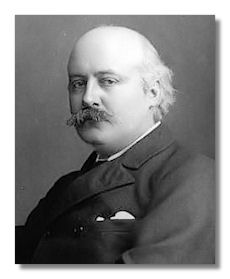
The Internet's Premier Classical Music Source
Related Links
-
Find CDs & Downloads
Amazon - UK - Germany - Canada - France - Japan
ArkivMusic - CD Universe
Find DVDs & Blu-ray
Amazon - UK - Germany - Canada - France - Japan
ArkivMusic-Video Universe
Find Scores & Sheet Music
Sheet Music Plus -
Recommended Links
Site News
Charles Hubert Hastings Parry

(1848 - 1918)
Best known for a single work, the choral song Jerusalem, this forgotten English Romantic was instrumental in bringing about the English musical renaissance at the end of the nineteenth century, and who, for the first time since Purcell, brought a distinctively English quality to western music.
The brief entry devoted to Parry in Baker's Concise Dictionary of Musicians concentrates solely on the social impact of Parry as an academic colleague of Sir Charles Villiers Stanford and a teacher of the likes of Ralph Vaughan Williams. No mention is made of any of his compositions or the effects these works may have had on the development of the English school in the late 19th and early 20th centuries. Parry was a Romantic composer who managed to balance an affinity for both Johannes Brahms and Richard Wagner in a time when there were few composers or other cognoscenti willing to admit being influenced by both.
Parry's early musical career at Eton and Oxford was fairly undistinguished, with a concentration of small-scale works such as songs, anthems and piano music in a Mendelssohnian vein. It was only after he began studies with the famous pedagogue Edward Danreuther in London in 1873 that his individual style came to the fore. Danreuther was a renown pianist who, after studying with Moscheles and Hauptmann in Leipzig, returned to England to introduce the concertos of Chopin, Schumann, Grieg and Liszt. He combined these activities with instilling a veneration of the classics in his students and a keen personal interest in the newest music of Wagner and Brahms. Parry's exposure to this environment was as a consequence instrumental in charting a course for his own musical interests.
It was not until 1875 that Parry began to produce significant works. Though he had joined the Wagner society in 1873, the chamber works he composed in the next few years reflected his Brahmsian approach to these forms. His association with Danreuther gave him an excellent opportunity to have these compositions played by some of these best musicians available in the chamber music recitals given at Danreuther's home.
In later years, Parry would go on to write in virtually every major large form: five symphonies, a piano concerto, a symphonic suite, an opera, an oratorio, and more than 30 works for chorus and orchestra. By 1893, he was appointed director of the Royal College of Music where he taught such future composers as Ralph Vaughan Williams, Gustav Holst, George Butterworth and Herbert Howells. In 1898, he took on additional duties as Professor of Music at Oxford. He was endowed with a warm personal charm and this made him an influential teacher. "At last I had met a man who did not terrify me" Gustav Holst said of him, "he gave us, so it seemed to me, a vision rather than a lecture".
In 1908, Parry suffered a downturn in the state of his health, due primarily to the rigorous schedule he had taken on with activities associated with the Royal College and Oxford. On his doctor's advice, he resigned his post at Oxford and curtailed his compositional activities for a while, retiring to Sicily for a period to regain his strength. The prescription did the trick, and his recuperation afforded him a further 10-year period in which he was to produce some of his best work, including his last symphony "Symphonic Fantasia" and the symphonic poem "From Death To Life".
Though Parry may not be of quite the same stature as Schumann or other giants of the Romantic age, he is among the most ingenious and endearing of the late Romantic composers, with a remarkable talent for compositions that are at once beautiful and powerful in their emotional content, and expertly wrought in their structure.
Recommended Recordings
Recommended Work
- Recommendation to come…
-













